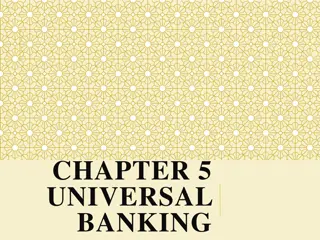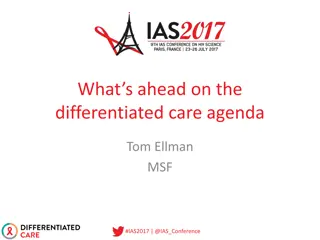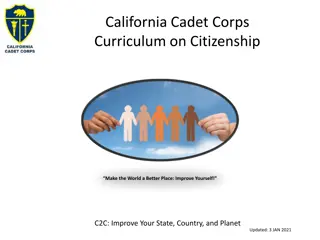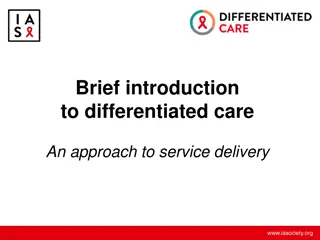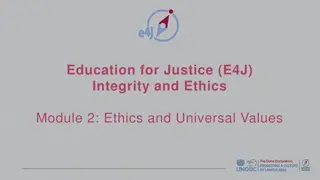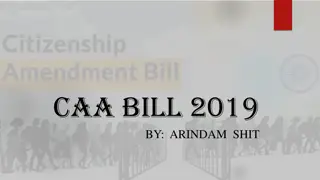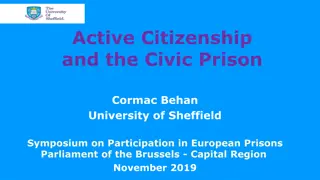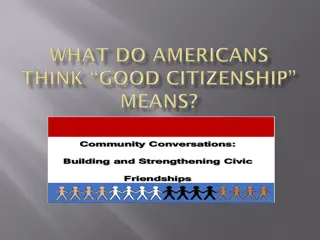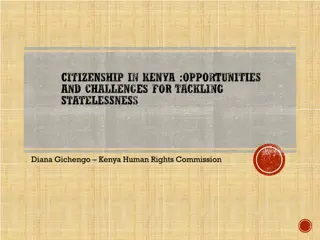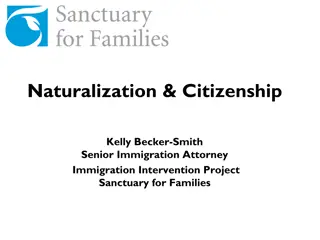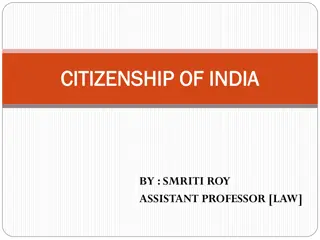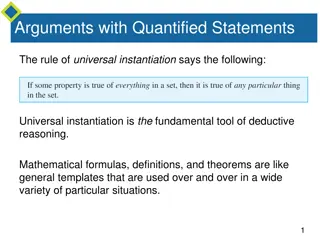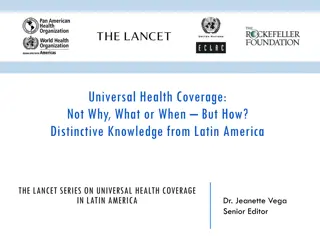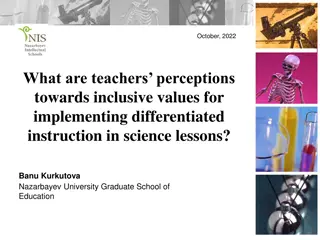Critique of Universal and Differentiated Citizenship
Universal citizenship embodies equality of rights for all citizens, while differentiated citizenship focuses on special representation rights for oppressed groups. Iris Marion Young criticizes the universalism in citizenship, advocating for differentiated citizenship to address the needs of marginalized groups. However, a clear definition of oppression and oppressed groups is lacking in Young's concept, highlighting challenges in building a theory of multicultural citizenship around oppression. In contrast, Will Kymlicka emphasizes the addition of group-differentiated rights to universal rights in a comprehensive theory of justice for a multicultural state.
Download Presentation

Please find below an Image/Link to download the presentation.
The content on the website is provided AS IS for your information and personal use only. It may not be sold, licensed, or shared on other websites without obtaining consent from the author. Download presentation by click this link. If you encounter any issues during the download, it is possible that the publisher has removed the file from their server.
E N D
Presentation Transcript
Universal Citizenship Universal Citizenship is the critiqued or modified opposite of multicultural citizenship. Universal citizenship, a product of the French and American revolutions refers to the equality of rights and status that have come to define membership in liberal-democratic nation-states: citizenship for everyone and everyone the same qua citizen (Young, 1989: 250). It has its own historical opposite: the tiered and multiple subject statuses and the particularistic rights and duties attached to them under feudalism.
Iris Marion Young and the Concept of Differentiated Citizenship The thrust of Iris Marion Young s radical formulation is to denounce the universal in universal citizenship as the disguised particularism of the dominant group/groups. Oppression is key to her scenario: society is seen as composed of social groups, which are either dominant or oppressed. Not much is said about the dominant group, despite occasional reference to white middle- class men . This omission is perhaps not accidental, because the dominant can hide their groupness under the cloth of universalism.
Differentiated Citizenship According to Young Differentiated Citizenship is mostly about special representation rights in the polity which is reserved for oppressed groups. Oppression is defined rather broadly as including anything from economic exploitation to cultural discrimination. From this broad definition of oppression follows a long list of groups entitled to differentiated citizenship: Women, blacks, Native Americans, Chicanos, Puerto Ricans and Spanish-speaking Americans, Asian Americans, gay men, lesbians, working-class people, poor people, old people, and mentally and physically disabled people.
Critical Evaluation of Differentiated Citizenship Young s failure to come up with a more concise definition and elaboration of what constitutes an oppressed group is instructive. It shows the difficulty of building a theory of multicultural citizenship around the notion of oppression . This notion is too vague and simplistic to account for the asymmetries of power and resources in complex societies. There is no explanation as to why should oppression stop when The Others are in charge. If universal is just a smokescreen for dominant group interests, the purpose cannot be inclusion into this false universal. Accordingly, the quest for differentiated citizenship is presented as a politics of difference that rejects traditional inclusion .
Comparison with Will Kymlicka The notion of oppression hardly appears at all in Kymlicka s (1995) liberal alternative of multicultural citizenship. For Kymlicka the relationship between universal and multicultural citizenship is not one of critique and substitution, but of simple addition. Rather than being subjected to a radical critique, universal rights are fine; the problem is that they are not enough for certain groups. A comprehensive theory of justice in a multicultural state will include both universal rights, assigned to individuals regardless of group membership, and certain group-differentiated rights or special status for minority cultures (Kymlicka, 1995: 6).
Comparison with Will Kymlicka (Contd.) Whereas Young s key concept was oppression, Kymlicka s is societal culture. Individuals need societal culture as a context of meaningful choices: without it there is no freedom (Kymlicka, 1995). In addition, access to a societal culture can become an issue of equality and justice under some circumstances. No state, not even liberal states, can be culturally neutral: e.g. in its selection of an official language a state inevitably promotes the majority culture, at the cost of the culture of minority groups. Given the inevitable nexus between state and majority culture, the traditional liberal answer to ethnic and cultural difference, benign neglect, is not enough. Thus, liberal justice requires special rights recognizing and protecting the cultures of minority groups.
Kymclickas Distinctive contribution Kymlicka s distinctive contribution has been the liberal mainstreaming of minority rights. After Kymlicka, the earlier confrontation between liberal defenders of universal citizenship and radical proponents of multiculturalism and group rights has lost its basis. A crucial difference to Young is the drastic narrowing of the minority groups entitled to special rights: only ethnic and national minority groups qualify. This is due to a narrow definition of the conditioning factor of group rights, societal culture.
Kymlickas Key Concept: Societal Culture Kymlicka defines societal culture as shared history, language, and territory, making it synonymous with a nation or a people . It is an intergenerational community which is more or less institutionally complete, occupying a given territory or homeland, sharing a distinct language and history. But this definition excludes non-ethnic groups, such as gays and lesbians, the disabled, or lifestyle groups, as multicultural claimants.
National Minorities and Immigrants The claims of the only two legitimate multicultural groups in Kymlicka s liberal scenario, national minorities and immigrants, differ in significant ways that ultimately militate against the very notion of multicultural citizenship. National minorities, such as the Catalans in Spain, the Quebecois in Canada, or the Aborigines in Australia, have the strongest claims within Kymlicka s scheme. i. All of them have institutionally complete cultures, that is, cultures that cover the full range of human activities, needs, and functions. ii. As the victims of nation-state building, they are forced to reside in states that do not carry the marks of their culture (most notably, their language). iii. To accommodate the potentially secessionist national minorities within multinational states, strong self-government rights are required, and also justifiable from the liberal point of view.
Self-government rights: A Threat to the Integrative Function Kymlicka does not hide the fact that these rights pose a serious threat to the integrative function of citizenship, because their thrust is separation, not integration (1995:188).





